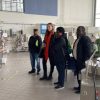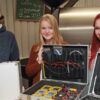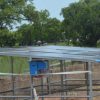“Greater cooperation is what we want.”

Supported by Green People’s Energy, the Ghanaian University of Energy and Natural Resources (UENR) and the University of Oldenburg (UOL) formed a partnership in 2022. In the Sustainable Energy Management study programme, master students from both universities work together to develop energy solutions. In this debate, Dr. Benjamin Batinge, MSc. Gloria Boateng Esinam and Hans Holtorf (PhD) talk about the advantages of partnering, cultural differences and what makes a good partnership.
Mr. Holtorf, you are a member of the team “Postgraduate Programmes Renewable Energy” (PPRE), managed by Dr. Herena Torío of the UOL. With your Ghanaian partner, you conducted the Sustainable Energy Management case study course at the Institute of Physics for the first time across two continents. How did you carry out this course in concrete terms?
Hans Holtorf: We put together six mixed teams of University of Energy and Natural Resources master students (from the Sustainable Energy Engineering and Management Master’s programme in Ghana and PPRE students from Oldenburg) and gave each team a research task. They had to independently analyse the respective challenges and find solutions.
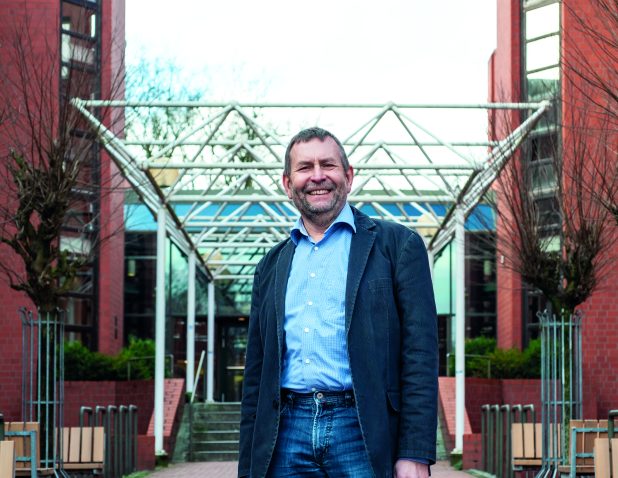
Benjamin Batinge: Together with the 13 Sustainable Energy Engineering and Management Master’s students and 21 PPRE students we regularly supervised the six individual groups in video conferences, gave technical input and also conducted field trips.
Can you give an example?
One team studied a Ghanaian irrigation system and had to make suggestions for optimising. Another looked for a solution for a chicken farm in Lower Saxony, Germany, on how they could use renewable energy to secure their energy supply. The chicken farm is very remote and suffers from power outages.
How did these groups work together?
Benjamin Batinge: We made it clear to students from the beginning that they would inform their fellow students who could not be in Ghana or Germany for the field investigation. They recorded interviews, shot videos, took photos, and shared findings with each other. This practical orientation of the format is especially important for African students and special.
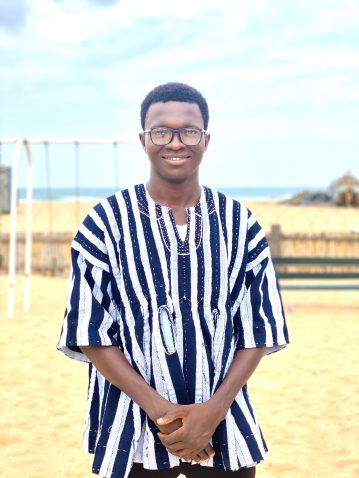
That worked?
Hans Holtorf: Yes. Except for some challenges, it worked well. A good indicator is that we want to continue our partnership. To do that, we will improve some processes.
What were the challenges?
Benjamin Batinge: The Internet kept causing problems. We also scheduled the seminars too early. Due to the time difference, the seminars started at seven in the morning in Ghana. Because students’ Internet was sporadic in their accommodation, some had to get up before six and rush to campus. We will schedule the courses later next semester. We also managed to get the university to purchase equipment for videoconferencing through the partnership support, which will greatly improve exchanges. Our challenges have led to concrete improvements.
Gloria Boateng-Esinam: There are also cultural differences that are challenging for everyone and at the same time a learning field. In African universities, students and teachers do not discuss things as openly as in Germany. In our country, the teacher is always right and it is not customary to contradict him. In this respect, the structure of the seminar, which lives from the discussions of the students, was also a positive experience for many students in Ghana.
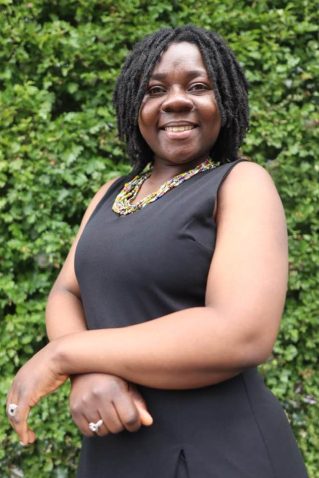
Were there cultural barriers?
Benjamin Batinge: I wouldn’t go that far, because people from different countries study in Ghana as well as in Oldenburg. Knowledge gaps exist on both sides, for example about the context of sub-Saharan Africa, energy supply or agricultural practices.
Hans Holtorf: I would also rather talk about cultural differences. Punctuality, for example, is defined differently in Germany and Ghana. If we dial in on time, and others arrive one by one, it’s a challenge. Perhaps we are too tightly scheduled and inflexible. Compared to another partnership our university has with Africa, our collaboration is very intense and very trusting.
What is the reason for that?
Hans Holtorf: The starting conditions were fortunate. My colleague Benjamin Batinge has already studied in Europe, he knows how higher education is structured in Europe. I know Africa very well. Above all, we have a driving force for our partnership in Gloria Boateng Esinam. She studied at the Regional Center for Energy and Environmental Sustainability (RCEES) at our partner university UENR in Ghana and now works for us as a research assistant in the PPRE master’s programme. We had quick and short lines of communication as a result. We can hardly overestimate this advantage. Thanks Gloria!
What does it take for a good partnership?
Benjamin Batinge: First of all, there needs to be a jointly drafted goal. Commitment and motivation among partners is also very important for success. After all, the bureaucratic effort on both sides is a challenge. And, of course, financial resources are needed. In this respect, despite our successfully launched partnership, it will remain a challenge to keep it sustainable and active.
Hans Holtorf: Clear agreements are also important. And you should communicate actively from the outset so that you can constantly adjust the goals and find solutions if you have different opinions.
Gloria Boateng-Esinam: From my point of view, both sides have to pay attention to tolerance, because both students and teachers have grown up in different contexts. And we should question our stereotypes. For example, a person in Ghana may have a higher level of education than someone in Oldenburg.
Despite the challenges, you want to continue the partnership. What are the advantages?
Hans Holtorf: A partnership like the one with RCEES lets us share knowledge, learn from each other. That applies to students just as much as to universities. It also applies to soft skills. It is precisely through their intense exchange with each other that students experience cultural diversity. This knowledge is becoming increasingly important and can already be a plus for future careers.
Benjamin Batinge: I see our partnership as an avenue for growth, both in terms of logistics and exchange. For me, the benefits outweigh the challenges.
What’s next for you?
Benjamin Batinge: We are currently working on a project proposal for seeking funding. In addition, the University of Oldenburg and our university have submitted a project proposal to the DAAD. If the funds are approved, we can strengthen our cooperation, because greater cooperation is what we want.
About the debate participants
Hans Holtorf (PhD) teaches at Faculty V – Mathematics and Natural Sciences at Carl von Ossietzky University Oldenburg in the Postgraduate Programmes Renewable Energy and focuses on off-grid energy service supply and possible renewable energy designs, including applications in sunbelt countries.
Dr. Benjamin Batinge is currently working as a research fellow at the Regional Center for Energy and Environmental Sustainability (RCEES) of the Ghanaian University of Energy and Natural Resources. He is the counterpart of the postgraduate programme at the University of Oldenburg. He studied in South Africa and in Norway.
Gloria Boateng-Esinam studied Postgraduate Programmes Renewable Energy at UOL from 2018 to 2020 in Germany. Before, she did her BSc. in the Renewable Energy Engineering programme at the UENR from 2012 to 2016 in Ghana. She was also a renewable energy engineer, designing solar systems in the technical team for Strategic Power Solutions in Tema, Ghana. After studying in Oldenburg, she worked as a research assistant at the University of Oldenburg and currently lives in Oldenburg.
